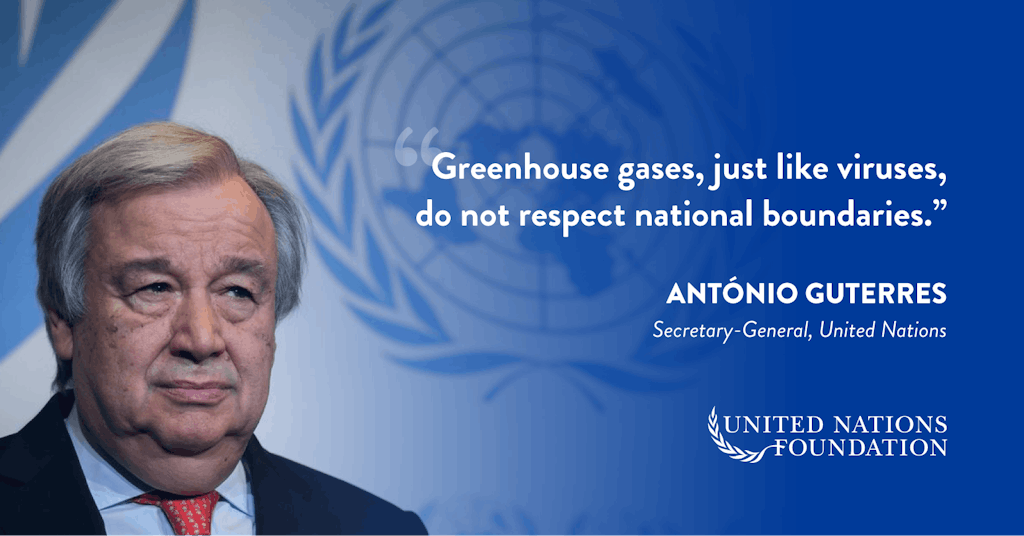“The impact of the coronavirus is both immediate and dreadful,” said Antonio Guterres, UN Secretary-General in an Earth Day address, “but there is another, deep emergency — the planet’s unfolding environmental crisis.”
On the 50th anniversary of Earth Day, Secretary-General Guterres underlined how the COVID-19 pandemic and the climate crisis are both examples of shared problems that can only be solved through global cooperation, and that “we must act decisively to protect our planet from both”. He used the moment to propose six climate-related actions to turn the post-COVID recovery “into a real opportunity to do things right for the future”.
We wanted to hear from young global climate activists about how we can deliver a healthy and resilient future for people and planet alike. So we reached out to the UN Foundation’s +SocialGood community of activists, advocates and entrepreneurs for the messages they wanted to send to global decision-makers, as the Secretary-General unveils his six-point plan for how the world can recover better.
1. Deliver new jobs and businesses through a clean, green transition.
Job loss during the pandemic has been staggering. In the US alone, unemployment rates are expected to reach 16% by July, the highest since the Great Depression. Before the pandemic hit, roughly 3 million Americans were working in the clean energy sector, outnumbering fossil fuel workers by 3-to-1. Globally, renewable energy jobs are closer to 11 million. Expanding green jobs benefits both the climate and health, especially as studies draw a positive correlation between COVID-19 deaths and polluted metro areas.
“Our future depends on the decisions we make today,” Priyanka Jaisinghani told us. She’s a +Social Good community member, journalist, and founder of GirlzFTW from the US, remarking that “as we start rebuilding the world, our world, we have a choice on how we restructure.” Emmanuel Nyame, another +SocialGood member in Ghana and founder of Educom.World, envisions “a world in which no one is left behind in the transition to a carbon free future. Where businesses are held accountable for the impacts they create on the world.”
2. Where taxpayers’ money is used to rescue businesses, it needs to be tied to achieving green jobs and sustainable growth.
A global recession is predicted for 2020, and the World Bank predicts GDP will contract in all developing regions. Government stimulus packages around the world are rolling out to bolster economies and this presents an opportunity to world leaders. “We are really at a crossroads,” says +SocialGood’s James da Costa, co-founder of Mandala Group, which builds mobile applications in rural India and Kenya for underserved communities — “Do we redesign our economy and our capitalistic system to work for our planet and for everyone, or do we go back to the normal of before? Young people think that businesses must take action and must be accountable for their pollution. They think we have to act in solidarity — including young people and stakeholders of all sizes at the decision-making table.”
3. Fiscal firepower must drive a shift from the grey to green economy.
“The green economy can enable millions more people to overcome poverty and deliver improved livelihoods for this and future generations,” says Deborah Greenfield, Deputy Director-General of the International Labour Organization, which in a 2018 study suggested that 24 million new jobs could be created globally by 2030 if sustainable policies were put in place in the energy sector. Grey economies produce pollution in everything from energy to infrastructure, while green ones rely on environmental processes to do the heavy lifting. In a case study of climate resiliency measures in Fiji, scientists found green infrastructure (afforestation, floodplain planting, etc.) more cost effective across the board when compared to grey (dredging rivers, elevating houses, etc.). Barriers to the green economy often lie with governments and a lack of institutional knowledge. In his Earth Day address, Guterres emphasized that as the world emerges from COVID-19, “we need to turn the recovery into a real opportunity to do things right for the future,” naming the green economy as one such opportunity. “I think it’s important to realize that we were able to mobilize a large amount of public will to take action on the coronavirus crisis so we should be aiming to do the same thing when it comes to the climate crisis,” says Sophia Kianni, 18-year old climate activist and national strategist for Fridays for Future. Sophia asks world leaders to recognize that while “we’re listening to scientists who told us that coronavirus was something serious to be addressed, we need to put that same energy and enthusiasm into listening to the scientists who are telling us that the climate crisis is something that must be combatted.”
4. Public funds should be used to invest in the future, not the past.
The window to stop the most devastating effects of climate change is narrowing. Guterres remarked in his Earth Day statement that public funds should “flow to sustainable sectors and projects that help the environment and the climate.” From energy, to fashion, to food, the future of the world depends on a departure from the past. Clarisse Mañabat is a +SocialGood member in the Philippines and co-founder of Green Rubber – Grub Footwear, a social enterprise which upcycles scrap tires and old jeans to make slippers. She told us she wants “a better 2030 where sustainable fashion is prioritized and businesses are held accountable for their impact on the planet.” Her sentiment is echoed by young people around the world as they protest inaction on the climate crisis and use their buying power to support sustainable businesses. “We believe that young people designing solutions to protect their land, water and culture will lead to a planet where nature and people strive together,” says +SocialGood’s Neeshad Shafi of Qatar, co-founder of the Arab Youth Climate Movement Qatar.
5. Climate risks must be incorporated into the financial system.
In his fifth suggestion to world leaders on a climate-friendly recovery plan for COVID-19, Guterres emphasized that climate risks, finance, public policy making, and infrastructure are all intrinsically connected. The International Monetary Fund predicts that the economic impact of climate change will accelerate, and policy makers and investors are starting to realize that climate — be it shifts in natural resource supply, weather patterns, droughts, or famines — has profound implications for the financial sector. As instances of extreme weather increase, the financial cost of poor planning and infrastructure shows. The technology exists to make the world’s communities more resilient, but funds and political will are often lacking. Guterres urges a shift in priorities to ensure no one is left behind as the world rebuilds after this crisis. COVID-19 “has not changed our need to build a more sustainable future,” says +SocialGood member Priyanka Jaisinghani, who goes on to stress that “across the globe we’re seeing how our problems in local neighborhoods are getting amplified during the lockdown and how our actions contribute to climate change.”
6. We need to work together as an international community.
This week, as part of the UN75 initiative, the United Nations released preliminary findings from its survey of global opinion on the future of international development. Data from 186 countries indicated overwhelming support for international cooperation with 95% of respondents agreeing that the world needs more effective partnerships between government, civil society, youth, women, indigenous peoples and vulnerable groups in policy making. “I envision a world where solidarity is not seen as an option,” says +SocialGood member Emmanuel Nyame, “but a sustainable way to propel growth and development.” Guterres asked world leaders to remember that “greenhouse gases, just like viruses, do not respect national boundaries,” and that the only way out of the COVID-19 and climate crises is through solidarity and international cooperation. “The solidarity and collaboration seen across the world gives me hope,” says +SocialGood member Abraham Ologundudu of Nigeria. His sentiment was echoed by another member, Sophia Kianni, who remarked that the outpouring of public will to respond to COVID-19 shows us the potency of collective action — that this wave must in turn be directed toward the climate crisis.

Climate action underpins the UN’s 2030 Agenda for Sustainable Development, and this Earth Day, the UN Secretary-General reminds us that there is a future beyond COVID-19. And it needs our help. In the words of +SocialGood community member Abraham Ologundudu “Let’s fight for shared prosperity, the common health of humanity, and the preservation of our planet.”
Find out more about UN Foundation’s +SocialGood community
DONATE TODAY
Every donation makes a difference. Support WHO’s life-saving efforts to respond to the COVID-19 pandemic by giving to the COVID-19 Solidarity Response Fund. Donations made via Facebook will be matched up to $10,000,000. Through June 30, 2020, for every $1 you donate here, Google.org will donate $2, up to $5,000,000.



 View All Blog Posts
View All Blog Posts


